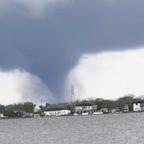Sleep Apnea Episodes May Trigger Irregular Heartbeat
Oct. 28 -- TUESDAY, Oct. 27 (HealthDay News) -- New research provides the first hard evidence that the characteristic snorting and gasping of sleep apnea can spur potentially fatal heartbeat abnormalities.
Previous studies have suggested an association between sleep apnea and cardiac arrhythmias but they had not established a cause-and-effect relationship, said study senior author Dr. Susan Redline, a professor of medicine at Case Western Reserve University in Cleveland.
But in this research, "we studied the specific risk of cardiac arrhythmias and sleep apnea -- do these events act as a trigger for cardiac abnormalities?" she said. "And we established that there is a close temporal relationship."
The study will be published in the Nov. 3 issue of the Journal of the American College of Cardiology.
Redline and colleagues at sleep research centers across the country studied nearly 2,900 polysomnograms -- detailed sleep-time recordings of biophysical activities of the brain, muscles and heart of more than 2,500 people participating in the nationwide Sleep Heart Health Study. Specifically, the researchers compared heartbeat patterns seen during normal breathing against those occurring within 90 seconds of a sleep apnea episode.
They detected 62 arrhythmias occurring in 57 people with a wide range of sleep apnea disorders. Overall, the study found that the odds of experiencing a heartbeat abnormality were 18 times higher immediately after an episode of sleep apnea than during periods of normal breathing of sleep.
The researchers focused on two dangerous heartbeat abnormalities: atrial fibrillation, a disordered fluttering of the two upper chambers of the heart (a major risk factor for stroke); and ventricular tachycardia, a too-fast beating of the lower blood-pumping chambers that can cause sudden death.
One important finding of the study was that these abnormal heart rhythms were not linked to the severity of a person's sleep apnea, Redline said. "The study did look to see whether more intense sleep apnea increased the risk of arrhythmias," she said. "In fact, most of the arrhythmias occurred in people with mild-to-moderate sleep apnea."




